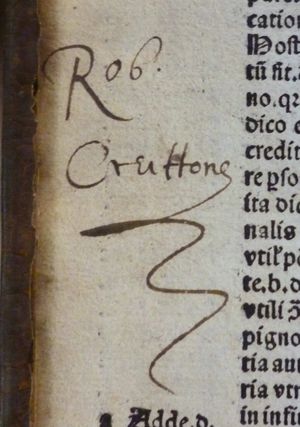Difference between revisions of "Robert Creighton 1593-1672"
m (Text replacement - "occupation::Bishop" to "Bishop") |
|||
| Line 3: | Line 3: | ||
====Biographical Note==== | ====Biographical Note==== | ||
| − | Born at [[place of birth::Dunkeld, Perthshire]], son of [[family::Thomas Creighton]]. BA [[education::Trinity College, Cambridge]] 1618, [[occupation::fellow of Trinity College, Cambridge|fellow]] 1619, MA 1621; [[occupation::Regius Professor of Greek]] 1625-39. [[Occupation::Prebendary]] of [[organisations::Lincoln Cathedral|Lincoln]] 1632, [[occupation::canon]] of [[organisations::Wells Cathedral|Wells]] 1633; he held several other ecclesiastical preferments. Forced to leave [[location::Wells]] in 1645, he went to [[location::Oxford]] for a while as [[occupation::chaplain]] to Charles I, before escaping to [[location::Cornwall]] in disguise, and thence to the continent where he spent the Interregnum as a [[occupation::chaplain]] to the court of Charles II in exile. He was made [[occupation::Dean]] of [[organisations::Wells Cathedral|Wells]] in 1660 and [[occupation::Bishop]] of [[diocese::Bath and Wells]] in 1670. He was noted as a scholar, and described by [[associates::John Evelyn|Evelyn]] as "a learned Grecian"; he published sermons and anti-presbyterian tracts, and a translation of a Greek history of the Council of Florence (''Vera historia unionis'', 1660). | + | Born at [[place of birth::Dunkeld, Perthshire]], son of [[family::Thomas Creighton]]. BA [[education::Trinity College, Cambridge]] 1618, [[occupation::fellow of Trinity College, Cambridge|fellow]] 1619, MA 1621; [[occupation::Regius Professor of Greek]] 1625-39. [[Occupation::Prebendary]] of [[organisations::Lincoln Cathedral|Lincoln]] 1632, [[occupation::canon]] of [[organisations::Wells Cathedral|Wells]] 1633; he held several other ecclesiastical preferments. Forced to leave [[location::Wells]] in 1645, he went to [[location::Oxford]] for a while as [[occupation::chaplain]] to Charles I, before escaping to [[location::Cornwall]] in disguise, and thence to the continent where he spent the Interregnum as a [[occupation::chaplain]] to the court of Charles II in exile. He was made [[occupation::Dean]] of [[organisations::Wells Cathedral|Wells]] in 1660 and [[occupation::bishop|Bishop]] of [[diocese::Bath and Wells]] in 1670. He was noted as a scholar, and described by [[associates::John Evelyn|Evelyn]] as "a learned Grecian"; he published sermons and anti-presbyterian tracts, and a translation of a Greek history of the Council of Florence (''Vera historia unionis'', 1660). |
====Books==== | ====Books==== | ||
Revision as of 04:10, 17 August 2020
Robert CREIGHTON or CREYGHTON or CREITTON 1593-1672
Biographical Note
Born at Dunkeld, Perthshire, son of Thomas Creighton. BA Trinity College, Cambridge 1618, fellow 1619, MA 1621; Regius Professor of Greek 1625-39. Prebendary of Lincoln 1632, canon of Wells 1633; he held several other ecclesiastical preferments. Forced to leave Wells in 1645, he went to Oxford for a while as chaplain to Charles I, before escaping to Cornwall in disguise, and thence to the continent where he spent the Interregnum as a chaplain to the court of Charles II in exile. He was made Dean of Wells in 1660 and Bishop of Bath and Wells in 1670. He was noted as a scholar, and described by Evelyn as "a learned Grecian"; he published sermons and anti-presbyterian tracts, and a translation of a Greek history of the Council of Florence (Vera historia unionis, 1660).
Books
Creighton was active in the 1660s in organising the repairs to Wells Cathedral after the damage of the Civil War and Commonwealth period, and is recorded in the donors' book as having given 33 books to the Chapter Library. His nuncupative will records the gift of his study of books to his son Robert (1636/7-1734), who was a prebendary of Wells from 1662 and also Professor of Greek at Cambridge (1666-72); the size of his library is not known. A 1566 edition of Homer now at Felbrigg Hall, given by Samuel Johnson to William Windham at the end of the 18th century, is extensively annotated by both Creightons, father and son, and testifies to the extent of their classical learning.
Characteristic Markings
Clingham and Hopkinson's article on the Felbrigg Homer notes the number of variant ways in which the Creightons spelt their name in various places. A 1575 Oratorum veterum in Lincoln College, Oxford with the inscription "Rob. Creittone" is probably either the Bishop, or possibly his son. A prayer book in Wells Cathedral has an armorial stamp of Creighton as Bishop on the covers.
Sources
- Armorials database.
- Clingham, G. & Hopkinson, N., Johnson’s copy of The Iliad at Felbrigg Hall, The Book Collector 37 (1988) 503-21.
- Macauley, John S. '"Creighton [Creyghton, Robert (1593–1672), bishop of Bath and Wells."'] Oxford Dictionary of National Biography.
- Wells Cathedral Library, Wells, 1982.
